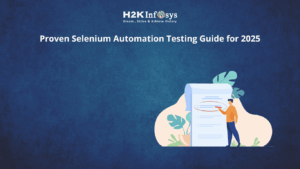Introduction
In today’s fast-paced software development world, automation testing isn’t just a convenience it’s essential. Businesses rely on it to deliver reliable, high-quality applications faster than ever. Tools like Selenium have been game-changers, enabling testers to automate repetitive tasks and speed up the development lifecycle. But as applications grow in complexity, even traditional automation testing faces challenges. That’s where machine learning (ML) steps in.
Machine learning is transforming automation testing by introducing adaptability, intelligence, and predictive power into testing processes. By integrating ML with tools like Selenium, teams can now automate smarter, detect problems earlier, and reduce test maintenance. Enrolling in a Selenium certification course equips professionals with the skills to leverage these advanced ML-driven tools and frameworks effectively. This blog explores how this transformation is unfolding, covering tools, trends, and the benefits ML brings to automation testing.
Why Automation Testing Needed a Boost
Before diving into ML’s role, it’s important to understand why traditional automation, even with powerful tools like Selenium, sometimes falls short:

- Static Scripts: Test scripts often break when the application’s UI or functionalities change.
- Heavy Maintenance: Updating scripts manually takes time and increases project overhead.
- Limited Coverage: Prioritizing test cases manually often leaves gaps in coverage.
- Delayed Defect Detection: Traditional methods catch issues late in the process, risking delays.
Machine learning transforms these limitations into opportunities for smarter, more resilient testing frameworks.
How Machine Learning Enhances Automation Testing
Adaptive and Self-Healing Test Scripts
Machine learning allows test scripts to detect changes in the application automatically. If a button or field moves or gets renamed, ML-based systems can identify the adjustment and update the locator without manual edits. This dramatically reduces script failures and maintenance time.
Predictive Defect Analysis
ML models analyze historical data, identifying areas in the code that are most prone to defects. Testers can then prioritize these areas, improving test coverage where it matters most. Predictive analytics helps teams focus on high-risk zones and prevent critical bugs before production.
Smarter Test Case Generation
By studying user behavior, historical bugs, and application structure, ML algorithms can suggest new test cases or modify existing ones. This ensures wider test coverage with less manual effort.
Test Prioritization Based on Risk
Not all tests need to run every time. Machine learning evaluates test outcomes and application changes to decide which tests are most crucial, running high-priority tests first and deferring less important ones. This approach saves time while maintaining quality.
Emerging Trends in ML-Powered Test Automation
Intelligent Test Automation Tools
The market is seeing a surge in AI- and ML-enhanced test automation tools that integrate smoothly with Selenium. These tools offer:
- Visual testing with smart anomaly detection.
- Self-healing scripts that adapt to UI changes.
- Test optimization and selection driven by historical data.
Natural Language Processing (NLP) for Test Authoring
Machine learning models powered by NLP are enabling testers to write test cases in plain English. These are then converted into executable test scripts. This opens up automation to non-technical team members, reducing bottlenecks.
Continuous Testing Optimization
Machine learning continuously analyzes test results, identifying patterns such as flaky tests or recurring issues. It automatically adjusts test suites to improve reliability and shorten feedback loops, essential for agile and DevOps pipelines.
Machine Learning’s Role in Selenium Automation
Selenium is one of the most popular open-source frameworks for web application testing. While it remains a core tool in automation testing, machine learning complements Selenium in several key ways:
Self-Healing Locators
In Selenium automation, locators (like XPath, ID, or CSS Selectors) identify elements on a page. When a locator changes, tests fail. ML can detect these changes by analyzing application structure and automatically repairing the locator, minimizing test failures.
Test Case Recommendation Engines
By integrating ML models with Selenium frameworks, testers receive recommendations on what additional test cases should be written based on defect-prone areas or missing coverage.
Predictive Test Analytics
ML analyzes past test outcomes and defect logs to forecast which areas might introduce defects in upcoming releases, guiding Selenium test planning.
Dynamic Test Execution
Rather than running all Selenium test cases, ML models help decide which ones to run based on code changes, risk levels, and past outcomes speeding up testing cycles.
Real-World Applications: How Companies Are Using ML in Automation Testing
Many large organizations have successfully implemented ML-driven testing strategies. For example:
- A leading financial software company uses machine learning to automatically generate Selenium test scripts based on application usage patterns, increasing coverage by 40%.
- An enterprise e-commerce platform integrated ML-based anomaly detection into their Selenium test pipeline, reducing false positives by 60% and improving production reliability.
These practical use cases demonstrate that machine learning isn’t just theoretical it delivers measurable improvements.
Top Tools Supporting Machine Learning in Test Automation
Although Selenium forms the base, several test automation tools now offer ML-powered enhancements:
- AI-based visual testing tools detect subtle UI differences missed by traditional pixel comparisons.
- Self-healing frameworks built on top of Selenium adjust locators dynamically.
- Predictive test analytics dashboards help QA managers track test health and forecast issues.
These tools enable teams to modernize existing Selenium frameworks without needing to replace them.
Benefits of Machine Learning in Automation Testing

Let’s summarize the advantages:
- Reduced Test Maintenance: Self-healing scripts lower manual script updates.
- Higher Test Coverage: Automated test generation and prioritization improve coverage.
- Faster Releases: Risk-based test prioritization reduces regression cycle times.
- More Reliable Test Results: Predictive analytics minimize false positives/negatives.
- Empowered Non-Technical Users: NLP-driven test creation broadens team involvement.
- Future-Proof Testing: ML adapts to changing application behaviors and structures.
Why Learn Selenium Automation with a Focus on ML
As the industry shifts toward intelligent automation, professionals with skills in Selenium automation testing integrated with machine learning will be in high demand. Testers who adapt will not only secure better roles but also lead modern QA initiatives in their organizations.
Online Selenium training programs, like those offered by H2K Infosys, incorporate hands-on projects and real-time scenarios preparing learners to work with both Selenium frameworks and ML-enhanced tools. A structured Selenium certification online ensures that participants are equipped with both foundational automation knowledge and insights into the latest AI-driven trends.
Key Takeaways
- Machine learning is transforming automation testing by making it more adaptive, predictive, and efficient.
- Selenium remains a vital tool, now enhanced by AI-driven capabilities like self-healing scripts and predictive test analytics.
- Emerging trends such as intelligent test generation, NLP-driven test authoring, and dynamic test execution are reshaping how teams approach QA.
- Testers can future-proof their careers by enrolling in comprehensive online Selenium training programs that cover ML integrations and real-world automation strategies.
Conclusion
Machine learning is changing the face of test automation, and professionals who upskill now will lead the next wave of intelligent QA practices.
Take the next step enroll in H2K Infosys’ Selenium course online today and master AI-powered automation testing.


























One Response
I love how machine learning is not just automating repetitive tasks but also bringing smarter insights into testing. The ability for these tools to learn from past tests and predict future bugs seems like a game-changing advancement for software quality assurance.